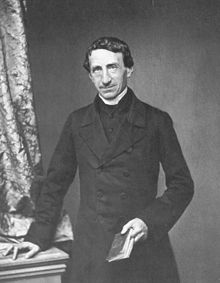Ignaz von Döllinger
| Ignaz von Döllinger | |
|---|---|

Ignaz von Döllinger, ca. 1860.
|
|
| Born |
February 28, 1799 Bamberg, Bavaria |
| Died | January 14, 1890 (aged 90) Munich |
| Nationality | German |
| Alma mater | University of Würzburg |
| Occupation | Theologian |
| Religion | Roman Catholic |
| Ordained | 5 April 1822 |
Johann Joseph Ignaz von Döllinger (28 February 1799 – 14 January 1890), also Doellinger in English, was a German theologian, Catholic priest and church historian who rejected the dogma of papal infallibility. He is considered an important contributor to the doctrine, growth and development of the Old Catholic Church, though he himself never joined that denomination.
Born at Bamberg, Bavaria, Döllinger came from an intellectual family, his grandfather and father having both been eminent physicians and professors of medical science; his mother's family were equally accomplished. Young Döllinger was first educated in the gymnasium at Würzburg, and then began to study natural philosophy at the University of Würzburg, where his father now held a professorship. In 1817 he began the study of mental philosophy and philology, and in 1818 turned to the study of theology, which he believed to lie beneath every other science. He particularly devoted himself to an independent study of ecclesiastical history, a subject very indifferently taught in Roman Catholic Germany at that time.
In 1820 he became acquainted with Victor Aimé Huber (1800–1869), a fact which largely influenced his life. On April 5, 1822 he was ordained a Roman Catholic priest for the Diocese of Bamberg, after studying at Bamberg, and in 1823 he became professor of ecclesiastical history and canon law in the lyceum at Aschaffenburg. He then took his doctoral degree, and in 1826 became professor of theology at the University of Munich, where he spent the rest of his life. About this time he brought upon himself the criticism of Heinrich Heine, who was then editor of a Munich paper. The unsparing satirist described the professor's face as the "gloomiest" in the whole procession of ecclesiastics which took place on Good Friday.
...
Wikipedia
